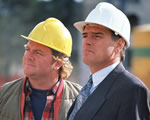 Go to main content
Go to main content
Archive Website of the UK government
Please note that this website has a UK government accesskeys system.
Main menu
Page menu
Employment

Safe manual work

There are many hazards that you might come across while doing manual work. Find out what the most common hazards are and how you can reduce your risk of injury at work.
Musculoskeletal Disorders
Musculoskeletal Disorders (MSDs) are the most common kind of work-related illness in the UK, and include problems like lower back pain, joint injuries and repetitive strain injuries. Most MSDs can be avoided if you know what causes them and how to protect yourself.
What are the causes of MSDs?
MSDs can be caused by:
- repetitive and heavy lifting
- bending and twisting, or repeating something too often
- working in an awkward or uncomfortable position
- using too much force
- working too long without breaks
- working in extreme conditions, for example too hot or cold
- using defective, worn or the wrong tools for the job
- not dealing with symptoms quickly enough
How can MSDs be prevented?
Most importantly, you need to make sure you are properly trained in how to:
- use tools and equipment safely
- handle heavy or awkward loads
You should also make sure that you:
- take regular breaks
- vary your work to reduce repetitive tasks
If you think you are suffering from a MSD, make sure you:
- report symptoms to your employer as soon as they develop
- get the right treatment
- are allowed enough time to recover properly
Other common problems
There are other potential problems at work, including:
Slips and trips
Slips and trips cause more than 30 per cent of all major injuries reported each year.
Falls from height
Falls from height are a hazard in all industrial sectors.
Vibration
Vibration can cause long-term health effects if it isn't dealt with properly.
Noise
Noise at work can cause permanent damage to hearing.
Your employer has a legal duty to assess all of these hazards in a risk assessment. As well as telling you about them, they must supply information, training and suitable protective measures to reduce the risks linked to the hazards.
Things to be aware of when lifting and carrying
Lifting and carrying can cause back pain. Before you lift or carry a load, you should first consider whether the load needs to be moved at all - maybe you can carry out your task with the load where it is.
If you must move it, think about whether you can use a machine to help you. If not, there are a number of ways to reduce risks, including:
- making the load smaller or easier to lift
- changing the way the work is arranged to cut down the distance it has to be carried, and to reduce the amount of twisting or lifting
- asking your employer to make changes to your work area, eg better lighting, more even flooring, or improved temperatures
- making sure you have the right training for lifting safely
Your employer's responsibilities
The Manual Handling Operations Regulations say your employer must:
- assess any hazardous manual handling operations that can't be avoided
- avoid hazardous manual handling operations if possible
- reduce the risk of injury by providing alternative methods of carrying out the task
What to do about back pain
If you suffer from back pain, you should stay active and try simple pain relief tablets. If the pain doesn’t go away or gets worse, you should talk to your GP.
If your back pain is caused by or made worse by your job, you should first speak to your employer. If you have an employee representative, eg a trade union official or a safety representative, they may be able to help you.
Extra help if you are disabled
If you are disabled, you may need extra help to do manual work. Your employer can speak to an 'Access To Work Adviser' via the local Jobcentre, who may be able to help pay for any changes needed, eg providing lifting equipment.
What to do next
To reduce risks when you are carrying out manual work:
- check whether your employer has carried out a risk assessment
- follow the recommendations about safe manual work and ask your employer to organise training if necessary
- tell your employer about any problems
In this section...
- Employees' health and safety responsibilities
- Employers' health and safety responsibilities
- Health and safety representatives
- Accidents in the workplace
- Safe computer use
- Suspension from work on medical/health and safety grounds
- Drug testing and employee monitoring
- Workplace stress
- Special health and safety hazards
 Facebook
Facebook Twitter
Twitter StumbleUpon
StumbleUpon Delicious
Delicious Reddit
Reddit